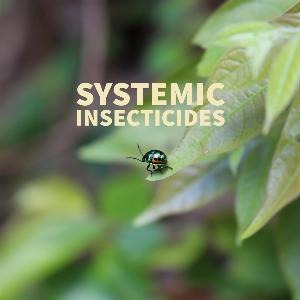Systemic insecticides can prevent an insect infestation before it even begins, saving untold damage to your yard and garden. Systemic insecticides work from the inside of the plant, deterring and killing most insects when they take their first bite. The systemic insecticide granules are applied to the soil around the plant and watered in. The water takes the insecticide down to the roots of the plant, where it is absorbed and translocated through natural growth and flow of the sap to the entire plant. Then, working from the inside of the plant, it kills sucking insects that feed on the plant. That is how systemic insecticides got that name: they work from within the system of the plant. Systemic insecticides can be applied to vegetables, trees and shrubs, rosebushes, flowers growing in beds, plants in containers and even house plants. Many systemic insecticides have fertilizer added to them, so you are fertilizing as well as protecting the plant. Systemic insecticides can be effectively applied to the soil before planting, or you can apply it after the plants have been set out. For most vegetables, apply as a narrow band on each side of the row and water in thoroughly. For flower beds, the systemic insecticide can be broadcast over the bed and watered in. Systemic insecticides, like Ferti-lome Rose and Flower Food with Systemic, are particularly valuable in protecting rose bushes from aphids and other rose-loving pests. Apply the Rose And Flower Food around the drip line of the rose bush every six weeks and water in. The drip line is the line around the plant where rain water would drip off. The roots of most plants normally extend out to the drip line, so that is where application of the systemic insecticide will be most effective. For best protection from insects, systemics should be applied at the beginning of the growing season. The plant then has the time to become fully protected before the insects are really active. Reapply as often as the label directions indicate to protect from insects all season long.




